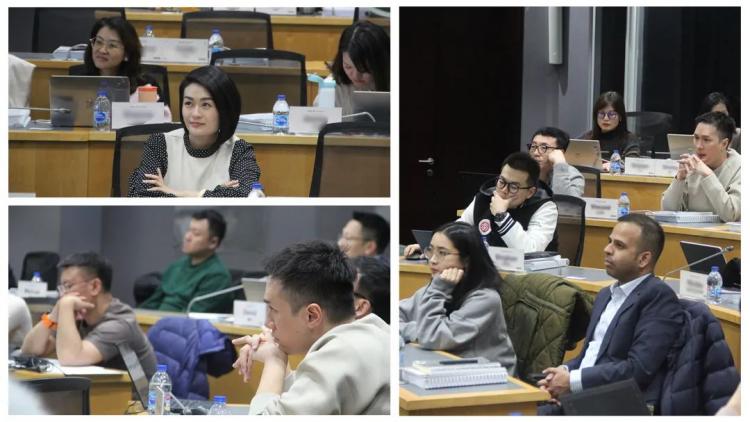GK Master Class Recap | China's Technology Going Global

Master Class
As China\'s economy continues to develop, its burgeoning tech industry is increasingly looking at expanding overseas. Chinese brands such as Xiaomi and TikTok have firmly established themselves as leaders in the international markets, and many other companies are exploring paths to go global. What has driven this trend? How will the future digital landscape go forward?
On January 6th, The Guanghua-Kellogg Executive MBA program was delighted to invite Ben Harburg, the managing partner at venture capital firm MSA Capital, for a Master Class to share his unique insights on the topic "China\'s Technology Going Global".
Speaker
Ben Harburg
Managing Partner at MSA Capital
Ben Harburg is the Managing Partner of MSA Capital, a global investment firm with $2 billion in assets under management. Prior to MSA, Harburg was a founding member of The Boston Consulting Group\'s Middle East system and built one of the largest commodities trading companies in Asia. Harburg serves on the Board of Directors of the National Committee on United States-China Relations. He is also a member of the Boards of Advisors of the Carnegie-Tsinghua Center for Global Policy and the Tufts University School of Arts & Sciences. He is a Term Member of the Council on Foreign Relations. Harburg was a Fulbright Scholar at Rhur University Bochum, where he was based in the Institute for Oriental and Islamic Studies.

The State of Play
In recent years, the world has seen unprecedented change in the field of technology, particularly in China. In Ben Harburg’s view, 2020 and 2021 were especially important for the globalization of Chinese companies. TikTok rose to prominence, seeing off a challenge from Facebook’s Lasso while SHEIN overtook Amazon as the most downloaded shopping app in the US.
The Covid-19 pandemic played an important role according to Harburg, which pushed Emerging Technology Markets (ETMs) to digitize in China’s image due to global lockdown conditions, reminiscent of the impact of SARS on China’s technology adoption. Ecommerce has exploded in size, particularly in the middle east, while E-wallets and mobile payments have also seen a rapid rise in adoption. Crucially, many of these developments mirror China’s own digital transformation, and offer investors an insight into how mature markets will ultimately progress.
At the same time, the pace of value creation in the public and private emerging markets is accelerating with investment firms such as Harburg’s MSA Capital able to deliver triple-digit annualized returns. This in turn has led to global investors rapidly increasing exposure to these emerging markets.

How China is Going Global
In light of the success of China’s Technology on the world stage, Harburg outlined a number of strengths held by Chinese companies responsible for their success.
Preloading an Ecosystem
As the smartphones market has matured, China has become the dominant player in affordable smartphones especially in Emerging markets with brands such as Xiaomi, Oppo/Vivo, and Transsion. By providing physical “last inch” delivery devices, Chinese companies have greater access to new users. This has coincided with Chinese phone makers bundling their phones with their own app stores (and in the case of Huawai, an entirely different operating system) increasing the exposure of these users to Chinese’ built applications and services.
Delivering Affordability
The business models of Chinese companies have proved conducive to growth in emerging markets. Many apps acquire customers by offering ‘high frequency low margin’ services such as food delivery and online payments before transitioning them to higher margin but lower frequency services. Chinese companies also benefit from extremely low supply chain costs and other efficiencies compared to their rivals and can source much more effectively from China.
Utilizing Best Practices
Chinese companies such as Tencent have been highly active in emerging markets by making investments and then sharing best practices with their portfolio companies. “Chuhai” companies have also emerged, built in China but tailored specifically for their target markets such as the middle east.
A Social Experience
Chinese tech companies have refined the process walking people online with social features such as live-streaming ecommerce and using user generated content (UGCs) to sell content. The population size of their target markets has also allowed companies to refine their models and algorithms effectively, providing strong mobile first entertainment experiences when they move to more mature and emerging markets.

The Pitfalls Ahead
Chinese firms face a number of challenges outside of China. In China, they are largely insulated from overseas competition, making the transition to a global company more challenging. Emerging markets also rarely have the same infrastructure conditions (such as addressing systems) that allow for hyper efficient low cost last mile delivery that aided the rise of ecommerce platforms like Pinduoduo. Mobile payments are also lacking, with some markets relying on cash on delivery, which gives rise to new challenges such as high return rates.
Chinese firms also face regulatory challenges and a more complex geopolitical environment. Having to adapt to each individual market, each with their own entrenched business interests is a key challenge ahead. These have also coincided with the rising stringency of local data storage requirements.


A Shared Future
Harburg concluded the Master Class by noting that many of the breakthroughs that have formed the foundation for modern technology and society were the result of co-innovation across borders. While the Wright brothers are credited with the invention of the airplane, this was an accomplishment built on the achievements of their contemporaries and predecessors in Europe. Just as Chinese companies have recently built off western innovations, western companies can and will replicate this process.
This idea of co-innovation is at the heart of the GK EMBA, and the program was established to blend the best of eastern and western business practices, enabling the next wave of progress. As our students continue to learn from experts and classmates from different backgrounds, we look forward to seeing how they innovate and bring about a brighter and shared future.
Futher Reading
GK Master Class | Marcin Piatkowski
Globalization Powered by Knowledge.
Welcome to the Guanghua-Kellogg Executive MBA Program!
About the Guanghua-Kellogg EMBA Program
The Guanghua-Kellogg EMBA Program is the first Sino-US joint EMBA Program in the mainland of China, bringing together the world-class faculties of two premier business schools and featuring a rigorous and cutting-edge curriculum. The program prepares executives with integrated management skills, Chinese business expertise, and a global perspective to lead their organizations in a dynamic environment. Kellogg’s EMBA global network offers students opportunities to engage in collaborations with peer leaders across the globe.
Scan the QR Code to Learn More

.
Click "Read more" to make an appointment with our admissions team.
(本文转载自 ,如有侵权请电话联系13810995524)
* 文章为作者独立观点,不代表MBAChina立场。采编部邮箱:news@mbachina.com,欢迎交流与合作。
热门推荐
备考交流
最新动态
- 邀请函 | 北京大学管理学博士联合培养项目香港站预备课5月9日见 2023-04-25
- 香港特区政府财政司司长陈茂波北大光华演讲:香港经济发展的方向与未来机遇 2023-04-23
- 「光华+ 启新讲堂01」俞大鹏:量子计算赋能第四次工业革命 2023-04-21
活动日历
- 01月
- 02月
- 03月
- 04月
- 05月
- 06月
- 07月
- 08月
- 09月
- 10月
- 11月
- 12月
- 04/02 暨南大学MBA名师公开课丨解析AI数字人跳舞视频——制作实操及变现路径
- 04/06 活动报名|投资风险与回报的掌控,港科大MBA大师课助你了解交易的智慧
- 04/06 这所双一流有调剂!云南大学EMBA/MTA调剂政策官方解读来了!
- 04/06 报名 | How your Firm will Shape the Future?“小火车”教授公开课暨复旦大学-BI(挪威)国际合作MBA项目说明会
- 04/08 今晚7点!哈尔滨工业大学商学院调剂说明会直播预约开启
- 04/10 4月10日招生开放日 | 第一批面试前最后一场,交大建筑本科学姐与你分享职业转型经历
- 04/11 【活动报名】4月11日@清华大学|2024科创产业投资峰会:硬科技、智能造、创未来
- 04/11 活动报名 | 中欧思创会洛阳站,聚焦智能制造
- 04/12 活动报名 | 香港中文大学(深圳)金融EMBA校园开放日暨24级课程说明会
- 04/12 长江MBA公开课:AI驱动下的企业变革|活动报名
热门资讯
MBA院校号
-
最新动态:
火速围观|北化经管MBA2023新生大数据














